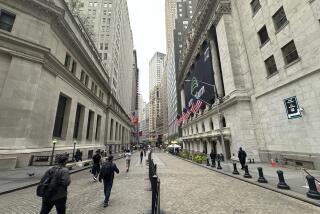NEWS ANALYSIS : Political Concerns Drive Tokyo’s Market Down 954 Points
- Share via
TOKYO — Japanese stock prices, which on Monday took their biggest plunge in more than two years, are expected to continue their volatility in the coming days as long as political turmoil threatens to delay economic stimulus.
The Nikkei index fell 954 points, or 4.9%, to close at 18,353 Monday. This was the steepest fall since Aug. 19, 1991, when a 1,358-point drop was touched off by the attempted coup in Russia.
In morning trading today, prices rebounded modestly on the strength of foreign investors’ and brokerage account dealers’ purchases, and the index rose 99 points to 18,452.
Monday’s selloff came in reaction to the parliamentary defeat Friday of a political reform package that Prime Minister Morihiro Hosokawa had made the centerpiece of his coalition government’s legislative efforts.
The setback not only guaranteed further delay of any economic stimulus program, it also threatened the unity of the seven-party ruling coalition.
Investors betting on imminent passage of the political reform program, which would have cleared the way for Hosokawa to concentrate on the economy, bid up the market last week. Thus, to a large degree, Monday’s plunge was a reaction to this disappointment, as investors liquidated those positions.
“We’re seeing a natural rebound, since the fall yesterday was a little overdone,” Daniel Marull, a trader at Bridge Trading Co., said during morning trading today. “But the political scene is still unclear and people are still worried.”
New political factors, rather than economic fundamentals, are likely to drive the market until the future of the Hosokawa Cabinet and its policy options become more clear. There is still a small possibility, for example, that Hosokawa might reach a compromise with the opposition Liberal Democratic Party to achieve passage of a revised political reform package later this week. Investors would almost surely treat that as good news.
“The volatility is going to be extremely high, and the reason for that is the political situation is filled with opinions but is unpredictable,” said Jesper Koll, an analyst with S.G. Warburg Securities.
“This week really could spike down to 17,500 (on the Nikkei) and could easily spike back up to 19,500,” he said. “If politicians find the magic bullet . . . on political reform, that means a green light for economic stimulus, and that means the market is going to go through the roof.”
Downward pressure on the market comes from fears that the political deadlock will become so severe that Hosokawa will call for elections.
That would not only bring uncertainties of an exceptionally fluid political situation, but could delay any serious economic program for months.
Chief Cabinet Secretary Masayoshi Takemura said Monday that the government will try to work simultaneously on political reform and economic stimulus, tax reform and the fiscal 1994 budget, which takes effect April 1.
“No firm schedule has been established,” Takemura but the government still aims to reach decisions in all these areas before Hosokawa’s Feb. 11 Washington summit with President Clinton, Takemura said.
Bank of Japan Governor Yasushi Mieno said Monday that Japan’s economic conditions remain in the doldrums and that recovery is likely to take more time. Analysts at Salomon Bros. Asia Ltd. predicted that the Bank of Japan may respond to the political disarray, and the resulting delay in implementation of an overall economic stimulus package, by cutting interest rates more quickly and deeply than has been expected.
The key question for the market now is whether the ruling coalition can muddle through, survive in office and enact a stimulus program, or whether Hosokawa will give up on that approach and call elections.
“If there is no election . . . the market will be stabilized, and even from now I think there would be some recovery,” said UBS Securities analyst Shigeru Akiba, “but if there is an election in the next few weeks, the market will go down more.”
More to Read
Inside the business of entertainment
The Wide Shot brings you news, analysis and insights on everything from streaming wars to production — and what it all means for the future.
You may occasionally receive promotional content from the Los Angeles Times.










